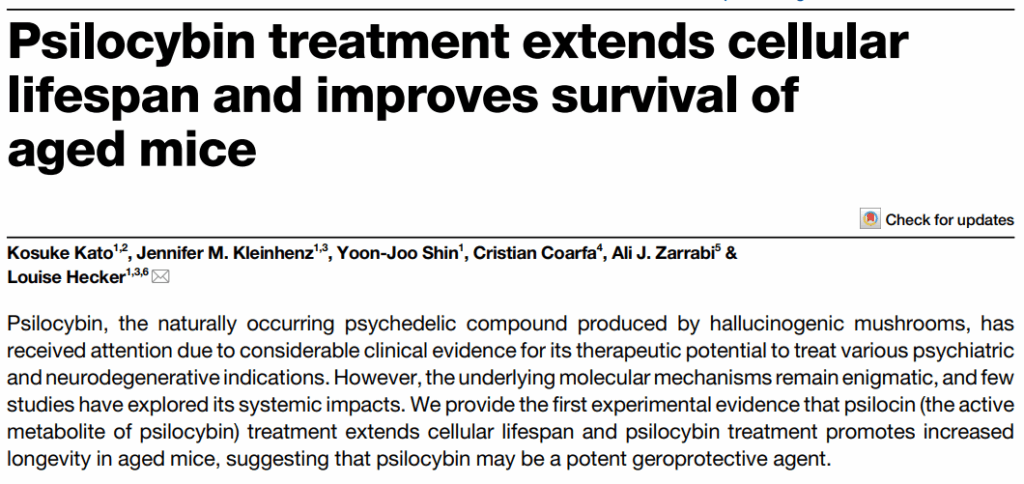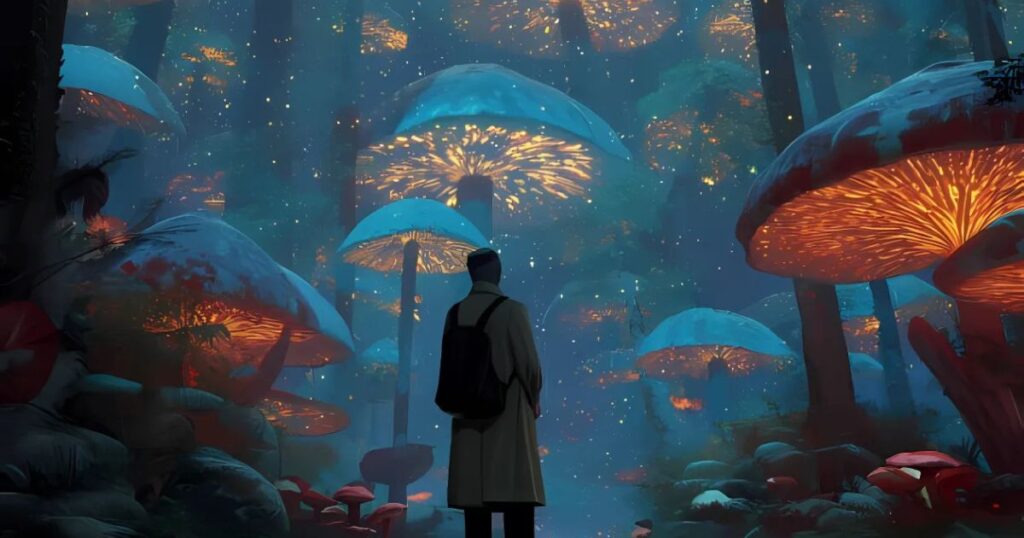As a microdoser and longtime psychonaut, I’ve been watching the recent wave of psychedelic headlines announcing “Mushrooms can help you live longer!” with excitement and concern. These sensationalized perspectives on some very cool research often miss or skip over the real context of the study.
The study behind the buzz, Kato et al. (2025), examined cells in a controlled lab setting where they were continuously exposed to varying concentrations of psilocin, which is derived from psilocybin. The researchers found that this did slow cellular aging and preserve the telomere length, a known way to assess cellular lifespan.

We’ll talk about telomeric aging in a moment, but first, it’s important to point out: this wasn’t a study on living people and it definitely did not study those among us who casually munch on shrooms.
That said they did study aged mice, giving them monthly doses of psilocybin which led to 10% longer lifespan. The result is eye-catching and fascinating, but we should be careful and respectful not to turn it into anti-aging hype.
We’ve got a few things to unpack here starting with Psilocybin and Psilocin. When Psilocybin is consumed, it is converted to Psilocin. This is the compound that actually interacts with serotonin receptors and causes the trip.
Some speed this (Lemontek) by soaking mushrooms in lemon juice, orange juice or even cola to convert some of the psilocybin to psilocin. This results in a faster and more intense experience than traditional methods because the body doesn’t have to first break down the psilocybin.
In the study, researchers skipped this stage entirely by using two concentrations of psilocin at 10 micromolar (μM) and a 100μM. The 10μM showed a 29% extension in cellular lifespan where the 100μM jumped to a 57% extension. Don’t get me wrong, this is awesome, but the context matters. These concentrations were applied 24/7 to a cell culture over time.
When we eat mushrooms, it is but a brief metabolized exposure and nowhere near these levels. To put this in perspective, you get ~20-30mg of psilocybin in ~3-5g of mushrooms. This converts to psilocin (as you now know) the levels of which would peak in the bloodstream at a concentration around ~10-30 nanomolar (nM) roughly 1000 times lower than the concentrations used in the study.
To even come close to this (don’t get any ideas), you would need absolutely massive and regular intake which could lead to toxicity, serotonin syndrome or even psychosis. It’s not a feasible thing for even the most experienced psychonauts to consider. Even if you could get past those issues, the body would be metabolizing things quickly and not maintain the needed levels on its own.
Hypothetically, to maintain the steady state needed to see any improvements would require some kind of subdermal implant to continuously monitor and release psilocin into the blood or some kind of constant IV infusion. It’s cool to think about, but it needs to be clarified that eating mushrooms is not the same as bathing all the cells of your body in a micromolar concentration of psilocin.
The aged mice part of this study is also interesting and contributes to the headlines. Researchers treated aged mice with monthly injections of psilocybin (not psilocin) which led to a notable 10% increase in lifespan compared to controls. This is significant! The human translated doses though would be equivalent to about ~.6-1g a day or 17-30g of mushrooms a month!
While this suggests serious (relative) potential, it’s important to remember that mice results don’t always directly apply to humans, and much more research is needed before drawing conclusions about mushrooms and longevity in people.
Eating this amount daily is potentially doable for an experienced psychonaut but real caution is advised as that’s getting well beyond microdose territory. This would essentially require tripping everyday of your life which is 100% not recommended due to the risks and drawbacks.
So what exactly is telomeric aging and why does it matter? Let me try to put my Biology courses from K-State to good use here. Every time a cell divides its DNA copies itself. You may remember mitosis cell diagrams showing this in school. Mitosis is key to human life and a contributor ironically to human death. Allowing cells to multiply and divide to continue growing and replacing damaged cells.
There are protective caps on each chromosome called telomeres. Think of these like the plastic caps on the end of a shoelace to keep it from unraveling. Every time a cell divides these caps get shorter. At a certain point when telomeres are too short to protect the chromosome it triggers the cell to stop dividing (senescence) or die (apoptosis). As senescent cells accumulate, they age-related problems like chronic inflammation, slower healing, neurodegeneration, metabolic disorders and even cancer.
In the Kato et al. study, a technique called quantitative polymerase chain reaction (qPCR) is used to measure telomere length. They found that the cells being continuously exposed to the psilocin concentrations mentioned earlier showed slower telomere degradation. In other words, the cells were able to keep doing their thing (mitosis) longer than their usual replication limits.
It is a groundbreaking discovery, but one that is difficult to apply to daily life without much more science and research. That being said, telomeric aging is still a theory and this study reinforced it perfectly, so kudos to psychedelics for helping us to understand aging with a little more clarity.
So no, it’s not realistic (or safe) to soak in high concentrations of psilocin your entire life even though we see every major news outlet jumping to over-simplified claims that “Mushrooms help you live longer”.
Even taking the mice example into account would be a lot of mushrooms for folks to be consuming regularly. However there are actually grounded and accessible ways to support your telomere health that are worth pointing out.
Starting with meditation and mindfulness. A 2014 meta-analysis by Shutte & Malouff found that meditation significantly reduces psychological stress,inflammation and cortisol all of which are toxic to telomeres.
In another study from 2013 by Ornish et al it was shown that a combination of lifestyle changes including plant-based diet, regular exercise, stress management and social support could increase telomere length over a five year period. This study was pivotal because they examined humans and proved for the first time that telomeres don’t only degrade.
Finally, in Colman et al, 2009 caloric restriction and intermittent fasting were proven (in monkeys) to lead to longer lifespans and fewer age related diseases.
I love seeing psychedelics open new doors for understanding ourselves, our biology and mental health, this research is undeniably promising. That said it is crucial to approach these findings with curiosity and caution.
Taking something proven in cell cultures or mice for granted and applying it directly to your life especially when it would require heavy shroom intake to replicate is not wise. We don’t want the hype to outpace the facts. Psychedelics are a tool for longer, happier lives but we need patience and realism when interpreting these results to keep folks honestly informed not swinging between sensational headlines.
For now, lean into the proven lifestyle habits that don’t have you tripping daily to increase your lifespan like mindfulness, balanced nutrition and exercise. Are those as fun as mushrooms? Well probably not. But they work and they should be embraced alongside the psilocin and psilocybin research if not more so. Here’s to seeing more of the science unfold. Stay humble, stay curious.
2014 meta-analysis by Shutte & Malouff https://pubmed.ncbi.nlm.nih.gov/24636500/
2013, Ornish et al https://pubmed.ncbi.nlm.nih.gov/24051140/
2009, Colman et al https://pubmed.ncbi.nlm.nih.gov/19590001/

Rob Sanchez is the founder and host of Apartment 113, a cannabis & psychedelics industry podcast and software product management company. With over 13 years of experience spanning the full seed-to-sale lifecycle, Rob has worked extensively in cannabis software, compliance, and ERP systems across North and South America, from Colombia to Canada.
A Certified Ganjier, Agile Coach, and Product Manager, he is passionate about championing authenticity over commercial hype. Through storytelling and community-building, Rob elevates cannabis and psychedelic culture by bridging media, technology, and industry innovation.
More from Rob here at Beard Bros below.
Perspectives and Potentials – Psychedelics Science 2025 Recap
















